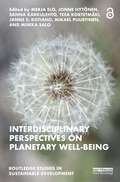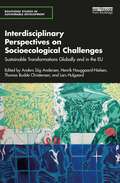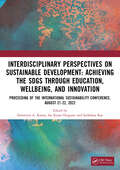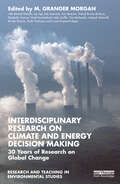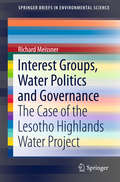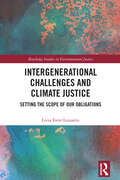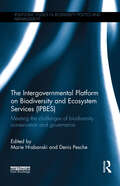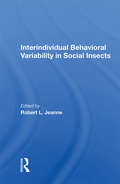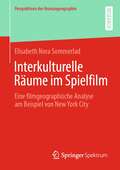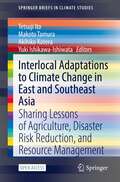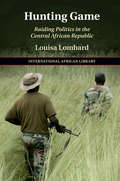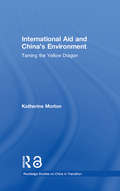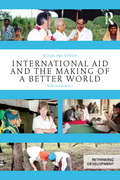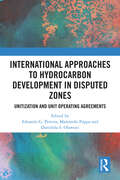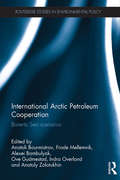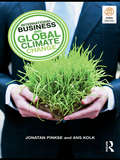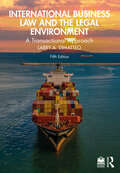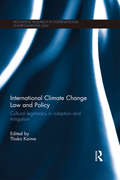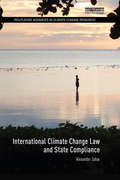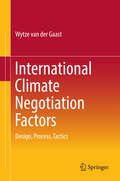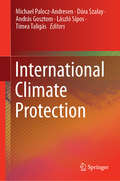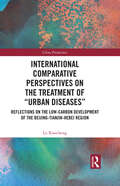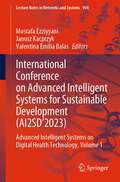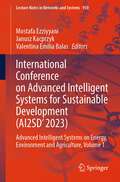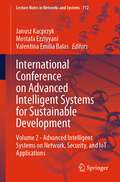- Table View
- List View
Interdisciplinary Perspectives on Planetary Well-Being (Routledge Studies in Sustainable Development)
by Merja Elo Jonne Hytönen Sanna Karkulehto Teea Kortetmäki Janne S. Kotiaho Mikael Puurtinen Miikka SaloThis book proposes a paradigm shift in how human and nonhuman well-being are perceived and approached. In response to years of accelerated decline in the health of ecosystems and their inhabitants, this edited collection presents planetary well-being as a new cross-disciplinary concept to foster global transformation towards a more equal and inclusive framing of well-being. Throughout this edited volume, researchers across the humanities, social sciences, and natural sciences apply and reflect on the concept of planetary well-being, showcasing its value as an interdisciplinary, cross-sectoral changemaker. The book explores the significance of planetary well-being as a theoretical and empirical concept in sustainability science and applies it to discipline-specific cases, including business, education, psychology, culture, and development. Interdisciplinary perspectives on topical global questions and processes underpin each chapter, from soil processes and ecosystem health to global inequalities and cultural transformation, in the framework of planetary well-being. The book will appeal to academics, researchers, and students in a broad range of disciplines including sustainability science, sustainable development, natural resources, and environmental humanities. Calling readers to assess, challenge, and rethink the dominant perceptions of well-being and societal activities, this rich resource that explores the interconnection between human and nonhuman well-being serves as a tool to foster transformative action towards a more sustainable society.
Interdisciplinary Perspectives on Socioecological Challenges: Sustainable Transformations Globally and in the EU (Routledge Studies in Sustainable Development)
by Anders Siig Andersen Henrik Hauggaard-Nielsen Thomas Budde Christensen Lars HulgaardThis book explores interdisciplinary perspectives on socioecological challenges and offers innovative solutions at both a European and global level. This book critically reflects on the latest scientific knowledge regarding the increasing instability of the Earth System caused by human activities during the Anthropocene and the Great Acceleration. It focuses on the global and European challenges regarding climate, resources, bio-integrity, and environment. The authors assess the obstacles to overcoming these challenges and examine the risks posed by path dependencies, lock-ins, and trade-offs between global and regional goals. They also drill down into the complexities of the European Green Deal, specifically the similarities and differences between the scientific analyses and recommendations from the European Environment Agency and the content of the Deal. Finally, the book looks at the Just Transition put forward by the European Green Deal. The authors discuss this in a context of global and European ecological and socioecological challenges and put the question of equality, recognition, and democratization at the center. Outlining new pathways to broaden the scope of scientific collaboration between the natural and technical sciences and the social sciences and the humanities, this volume will be of great interest to students and scholars of sustainable development, environmental policy and governance, and environmental justice.
Interdisciplinary Perspectives on Sustainable Development: Achieving the SDGs through Education, Wellbeing, and Innovation
by Dimitrios A. Karras Sai Kiran Oruganti Sudeshna RayISC 2022 is dedicated to the Niti Aayog policies to promote sustainability through exchange of ideas emerging out of the academia. The ISC is an annual conference that is held in virtual mode until COVID restrictions on travel exist. The vision of the conference is to capacitate Academia with the necessary ideas that provide insights of the grassroot level development to various stakeholders of the Niti-Aayog policies. Towards this goal, the conference creates a conjunction of various stakeholders of Niti-Aayog policies that include- academic institutions, government bodies, policy makers and industry. The ISC organizers make concerted efforts to promote academic research that would technological, scientific, management & business practices, and insights into policy merits & disruptions. The framework of exchange of ideas is geared towards adoption of deep technologies, fundamental sciences & engineering, energy research, energy policies, advances in medicine & related case studies. This framework enables the round table discussions between the academia, industry and policy makers through its range of plenary and keynote speakers.
Interdisciplinary Research on Climate and Energy Decision Making: 30 Years of Research on Global Change (Research and Teaching in Environmental Studies)
by Granger M. Morgan Ahmed Abdulla Jay Apt Inês Azevedo Ann Bostrom Bruin, Wändi Bruine de Elizabeth Casman Hadi Dowlatabadi Mike Griffin Tim McDaniels Joshuah Stolaroff Brinda Thomas Parth VaishnavThis book explores the role and importance of interdisciplinary research in addressing key issues in climate and energy decision making. For over 30 years, an interdisciplinary team of faculty and students anchored at Carnegie Mellon University, joined by investigators and students from a number of other collaborating institutions across North America, Europe, and Australia, have worked together to better understand the global changes that are being caused by both human activities and natural causes. This book tells the story of their successful interdisciplinary work. With each chapter written in the first person, the authors have three key objectives: (1) to document and provide an accessible account of how they have framed and addressed a range of the key problems that are posed by the human dimensions of global change; (2) to illustrate how investigators and graduate students have worked together productively across different disciplines and locations on common problems; and (3) to encourage funders and scholars across the world to undertake similar large- scale interdisciplinary research activities to meet the world’s largest challenges. Exploring topics such as energy efficiency, public health, and climate adaptation, and with a final chapter dedicated to lessons learned, this innovative volume will be of great interest to students and scholars of climate change, energy transitions and environmental studies more broadly.
Interest Groups, Water Politics and Governance
by Richard MeissnerThe book investigates the role interest groups have played over the years to influence the governments of Lesotho and South Africa, the World Bank and project implementation authorities in changing some policy aspects of the Lesotho Highlands Water Project (LHWP). Some of the issues being agitated by the interest groups are the resettlement of villagers where some of the dams for the projects are being constructed. The author argues that interest groups and individuals have the ability to influence the above-mentioned institutions and to such an extent that water politics and governance is not the domain of state institutions only.
Intergenerational Challenges and Climate Justice: Setting the Scope of Our Obligations (Routledge Studies in Environmental Justice)
by Livia Ester LuzzattoClimate change poses questions of intergenerational justice, but some of its features make it difficult to determine whether we have obligations of climate justice to future generations. This book offers a novel argument, justifying the present generation’s obligations to future people. Livia Luzzatto shows that we have intergenerational obligations because many of our actions are based on presuppositions about future people. When agents engage in such intergenerational actions, they acquire an obligation to also recognize those future people as agents within their principles of justice, and with that a duty to respect their agency and autonomy. Intergenerational Challenges and Climate Justice also offers a way to circumvent the problems of non-identity and non-existence. Its approach overcomes the intergenerational challenges of climate change by meeting three necessary criteria: providing ways to cope with uncertainty, dealing with the complexity of climate change, and including future people for their own sake. The author meets these criteria by adopting an action-centered methodology that grounds our obligations of justice on the presuppositions of activity. This robust framework can be used to justify increased climate action and the greater inclusion of future-oriented policies in current decision making. This book will be of great interest to academics and students concerned with the issues of climate and intergenerational justice.
The Intergovernmental Platform on Biodiversity and Ecosystem Services: Meeting the challenge of biodiversity conservation and governance (Routledge Studies in Biodiversity Politics and Management)
by Marie Hrabanski Denis PescheTwenty years after the Convention on Biological Diversity (CBD) entered into force, the founding of the Intergovernmental Platform on Biodiversity and Ecosystem Services (IPBES) in 2012 was the outcome of a long process of setting biodiversity issues at the top of the global environmental agenda. With contributions from more than a dozen well-renowned researchers in political science, law and sociology, this book analyzes IPBES functioning and challenges in terms of the knowledge selection process and actors involved. The book reveals that, through its conceptual framework, IPBES promotes a pluralistic view of nature that calls for a broadening of the disciplinary frontiers. It combines natural science and social science research and also includes indigenous and local knowledge. IPBES is considered to represent the institutionalization of a permanent knowledge assessment on biodiversity and is often referred to as an IPCC success story, constituting a new stage in global environmental governance. In analyzing the knowledge selection process for IPBES decision making, the book better situates IPBES within the biodiversity and global governance domain. It ultimately argues that the establishment of IPBES provides a new opportunity to coordinate the different international conventions (CBD, RAMSAR, CITES, etc.) and initiatives (international assessment of marine biology, scientific programs, funding, etc.).
Interindividual Behavioral Variability In Social Insects
by Robert L. JeanneThis book represents empirical studies of some aspect of the phenomenon of variability in social insect behavior. It illustrates the range of ways colony members can differ from one another and interprets the variability in terms of the external environment, social context, or individual experience.
Interkulturelle Räume im Spielfilm: Eine filmgeographische Analyse am Beispiel von New York City (Perspektiven der Humangeographie)
by Elisabeth Nora SommerladSpielfilme imaginieren New York City oft als eine Stadt, in der das alltägliche Zusammenleben durch interkulturelle Begegnungen konstituiert wird. Das vorliegende Buch nimmt sich diesem Topos an. Die filmgeographische Studie analysiert, wie Spielfilme interkulturelle Begegnungen inszenieren. Die Autorin erarbeitet anhand von 17 US-amerikanischen Spielfilmen, wie interkulturelle Begegnungen strategisch inszeniert werden. Hierbei hinterfragt sie kritisch die Darstellungen gesellschaftlicher Herausforderungen, welche sich im Kontext des dargebotenen Miteinanders ergeben. Das Ergebnis sind sechs vielschichtige Dimensionen interkultureller Räume. Diese offenbaren, dass NYC letztlich vor allem als Stadt kultureller Koexistenz inszeniert wird – als Projektionsfolie einer Gesellschaft, in der sich Individuen anhand diffuser kultureller Marker beständig voneinander abgrenzen. Die Studie liefert damit einen Beitrag zum mediensensiblen Diskurs über interkulturelle Fragestellungen, denen in globalisierten, kulturell diversen und medienaffinen Gesellschaften höchste Relevanz zukommt.
Interlocal Adaptations to Climate Change in East and Southeast Asia: Sharing Lessons of Agriculture, Disaster Risk Reduction, and Resource Management (SpringerBriefs in Climate Studies)
by Tetsuji Ito Makoto Tamura Akihiko Kotera Yuki Ishikawa-IshiwataThis Open Access book’s main focus is agriculture and natural resource management, disaster risk reduction, and human resource development in the countries of East and Southeast Asia and Japan.Asia is one of the regions which is the most vulnerable to the impacts of climate change. More than sixty percent of the world’s people live in the region, making it the growth center of the world. Asia is vast and includes various countries and regions, this book is focused on East and Southeast Asia including Japan. It is essential to share the knowledge and experiences for adapting climate change among these areas.In order to tackle these issues, the book aims to:Promote inter-local lessons learnt sharing climate change adaptations; "agriculture and natural resource management" and "disaster risk reduction and human resource development"Provides insights into new adaptation measures and research approaches that can consider the regional nature of Southeast AsiaShare practical adaptation options permeated by society in each country/regionThis book will be of interest to researchers and students examining climate change impacts in East and Southeast Asia.
The International African Library: Raiding Politics In The Central African Republic (The\international African Library #61)
by Louisa LombardInternational Aid and China's Environment: Taming the Yellow Dragon (Routledge Studies on China in Transition #Vol. 25)
by Katherine MortonRapid economic growth in the world's most populous nation is leading to widespread soil erosion, desertification, deforestation and the depletion of vital natural resources. The scale and severity of environmental problems in China now threaten the economic and social foundations of its modernization. Using case studies, Morton analyzes the relationship between international and local responses to environmental problems in China, challenging the prevailing wisdom that weak compliance is the only constraint upon local environmental management in China. It advances two interrelated discussions: first, it constructs a conceptual framework for understanding the key dimensions of environmental capacity. This is broadly defined to encompass the financial, institutional, technological and social aspects of environmental management. Second, the book presents the results of an empirical inquiry into the implementation of donor-funded environmental projects in both China's poorer and relatively developed regions. By drawing upon extensive fieldwork, it seeks to explain how, and under what conditions, international donors can strengthen China's environmental capacity, especially at the local level. It will be of interest to those studying Chinese politics, environmental studies and international relations.
International Aid and the Making of a Better World: Reflexive Practice (Rethinking Development)
by Rosalind EybenHow can international aid professionals manage to deal with the daily dilemmas of working for the wellbeing of people in countries other than their own? A scholar-activist and lifelong development practitioner seeks to answer that question in a book that provides a vivid and accessible insight into the world of aid – its people, ideas and values against the backdrop of a broader historical analysis of the contested ideals and politics of aid operations from the 1960s to the present day. Moving between aid-recipient countries, head office and global policy spaces, Rosalind Eyben critically examines her own behaviour to explore what happens when trying to improve people’s lives in far-away countries and warns how self-deception may construct obstacles to the very change desired, considering the challenge to traditional aid practices posed by new donors like Brazil who speak of history and relationships. The book proposes that to help make this a better world, individuals and organisations working in international development must respond self-critically to the dilemmas of power and knowledge that shape aid’s messy relations. Written in an accessible way with vignettes, stories and dialogue, this critical history of aid provides practical tools and methodology for students in development studies, anthropology and international studies and for development practitioners to adopt the habit of reflexivity when helping to make a better world.
International Approaches to Hydrocarbon Development in Disputed Zones: Unitization and Unit Operating Agreements
by Eduardo G. Pereira Marianthi Pappa Damilola S. OlawuyiThis book analyses the legal obstacles associated with the advancement of unitization processes and procedures at an international level.Using case studies in international (cross-border) unitization and joint development agreements, the book uses regional examples from the Americas, Europe, Africa and the Middle East. It also touches upon case studies related to ongoing disputes from the South China Sea, Mediterranean Sea and Gulf of Guinea. Focusing on best practices which have influenced the development of the unitization concept, the book looks at the formulation of different models and agreements, and their potential impact on unexplored hydrocarbon resources, particularly in cases where unitization is necessary.The book will be of interest to practitioners, scholars and students in the field of natural resource law, international law and unitization.
International Arctic Petroleum Cooperation: Barents Sea Scenarios (Routledge Studies in Environmental Policy)
by Indra Overland Anatoli Bourmistrov Frode Mellemvik Alexei Bambulyak Ove Gudmestad Anatoly ZolotukhinThe Arctic region contains large amounts of natural resources considered necessary to sustain global economic growth, so it is unsurprising that it is increasingly susceptible to political, economic, environmental, and even military conflicts. This book looks in detail at the preconditions and outlook for international cooperation on the development of Arctic petroleum resources, focusing on Norwegian–Russian cooperation in the Barents Sea towards 2025. The authors provide a cross-disciplinary approach including geopolitical, institutional, technological, corporate and environmental perspectives to analyse the underlying factors that shape the future development of the region. Three future scenarios are developed, exploring various levels of cooperation and development influenced by and resulting from potential political, commercial and environmental circumstances. Through these scenarios, the book improves understanding of the challenges and opportunities for Arctic petroleum resource development and promotes further consideration of the possible outcomes of future cooperation. The book should be of interest to students, scholars and policy-makers working in the areas of Arctic studies, oil and gas studies, energy security, global environmental governance, environmental politics and environmental technology.
International Business and Global Climate Change
by Jonatan Pinkse Ans KolkClimate change has become an important topic on the business agenda with strong pressure being placed on companies to respond and contribute to finding solutions to this urgent problem. This text provides a comprehensive analysis of international business responses to global climate change and climate change policy. Embedded in relevant management literature, this book gives a concise treatment of developments in policy and business activity on global, regional and national levels, using examples and systematic data from a large number of international companies. The first part outlines the international climate policy landscape and voluntary initiatives taken by companies, both alone and together with others. The second part examines companies’ strategies, covering innovation for climate change, as well as compensation via emissions trading and carbon offsetting. Written by well-known experts in the field, International Business and Global Climate Change illustrates how an environmental topic becomes strategically important in a mainstream sense, affecting corporate decision-making, business processes, products, reputation, advertising, communication, accounting and finance. This is a must-read for academics as well as practitioners concerned with this issue.
International Business Law and the Legal Environment: A Transactional Approach
by Larry A. DiMatteoThe fifth edition of International Business Law and the Legal Environment: A Transactional Approach gives business and law students a clear understanding of the legal principles that govern international business. This book goes beyond compliance by emphasizing how to use the law to create value and competitive advantage.DiMatteo’s transactional approach walks students through key business transactions—from import and export, contracts, and finance to countertrade, dispute resolution, licensing, and more—giving them both context and providing real-world applications. This new edition also features:● Added coverage of new technologies, such as smart contracts, digital platforms, and blockchain technology, artificial intelligence, market for non-fungible tokens, and the metaverse● Discussion of businesses and sustainability, climate change, and creating a circular economy● International perspective and use of a variety of national and international law materials● Greater coverage of EU substantive law including the new Artificial Intelligence Act.Upper-level undergraduate and postgraduate students of business law and international business will appreciate DiMatteo’s lucid writing style, and professionals will find this book to be a comprehensive resource. Online resources include an instructor’s manual, PowerPoint slides, and test bank.
International Climate Change Law and Policy: Cultural Legitimacy in Adaptation and Mitigation (Routledge Research in International Environmental Law)
by Thoko KaimeClimate change poses fundamental and varied challenges to all communities across the globe. The adaptation and mitigation strategies proposed by governments and non-governmental organisations are likely to require radical and fundamental shifts in socio-political structures, technological and economic systems, organisational forms, and modes of regulation. The sheer volume of law and policy emanating from the international level makes it uncertain which type of regulatory or policy framework is likely to have a positive impact. The success or failure of proposed measures will depend on their acceptability within the local constituencies within which they are sought to be applied. Therefore there is an urgent need to better comprehend and theorise the role of cultural legitimacy in the choice and effectiveness of international legal and policy interventions aimed at tackling the impact of climate change. The book brings together experts to present perspectives from different disciplines on the issue of international climate change law and policy. Beginning from the premise that legitimacy critiques of international climate change regulation have the capacity to positively influence policy trends and legal choices, the book showcases innovative ideas from across the disciplines and investigate the link between the efficacy of international legal and policy mechanisms on climate change and cultural legitimacy. The book includes chapters on with a theoretical basis as well as specific case-studies from around the globe. The topics covered include: land use planning as a tool of enhancing cultural legitimacy, indigenous peoples in international environmental negotiations, transnational advocacy networks, community-based forestry management and culture and voluntary social movements.
International Climate Change Law and State Compliance (Routledge Advances in Climate Change Research)
by Alexander ZaharA solution to the problem of climate change requires close international cooperation and difficult reforms involving all states. Law has a clear role to play in that solution. What is not so clear is the role that law has played to date as a constraining factor on state conduct. International Climate Change Law and State Compliance is an unprecedented treatment of the nature of climate change law and the compliance of states with that law. The book argues that the international climate change regime, in the twenty or so years it has been in existence, has developed certain normative rules of law, binding on states. State conduct under these rules is characterized by generally high compliance in areas where equity is not a major concern. There is, by contrast, low compliance in matters requiring a burden-sharing agreement among states to reduce global greenhouse gas emissions to a ‘safe’ level. The book argues that the substantive climate law presently in place must be further developed, through normative rules that bind states individually to top-down mitigation commitments. While a solution to the problem of climate change must take this form, the law’s development in this direction is likely to be hesitant and slow.The book is aimed at scholars and graduate students in environmental law, international law, and international relations.
International Climate Negotiation Factors
by Wytze GaastProviding a detailed examination of climate negotiations records since the 1990s, this book shows that, in addition to agreeing on climate policy frameworks, the negotiations process is of crucial importance to success. Shedding light on the dynamics of international climate policymaking, its respective chapters explore key milestones such as the Kyoto Protocol, Marrakech Accords, Cancun Agreement and Doha Framework. The book identifies a minimum of three conditions that need to be fulfilled for successful climate negotiations: the negotiations need to reflect the fact that climate change calls for global solutions; the negotiation process must be flexible, including multiple trajectories and several small steps; and decisive tactical maneuvers need to be made, as much can depend on, for example, personalities and the negotiating atmosphere. With regard to the design of an international climate policy regime, the main challenge presented has been the inability to agree on globally supported greenhouse gas emission reduction measures. The book offers an excellent source of information for researchers, policymakers and advisors alike.
International Climate Protection
by Michael Palocz-Andresen Dóra Szalay András Gosztom László Sípos Tímea TaligásThis book explains the current climate protection processes and technologies, and informs the readers of the limiting factors and opportunities for future development. It represents the highest level of knowledge from leading scientists all over the world. Original high quality figures maximize understanding of the text. The book also introduces a new concept (climatographic), which provides a well pronounced solution to climate protection that is easily understandable for all levels of readers.
International Comparative Perspectives on the Treatment of “Urban Diseases”: Reflections on the Low-Carbon Development of the Beijing-Tianjin-Hebei Region (China Perspectives)
by Lu XiaochengWith an integration of theories, comparative and empirical studies, this book aims to find a treatment for Beijing’s “urban diseases” and coordinate a low-carbon development plan for the Beijing-Tianjin-Hebei region in China. Unprecedented industrialization and unconventional urbanization caused a series of “urban diseases” for developing cities across the globe. By summarizing and exploring the evolution and phased characteristics of “urban diseases”, the author implements theories across classical sociology, human ecology, community school, and low-carbon city as the base for policy recommendations. This book also provides in-depth examinations and comparative studies of other metropolises’ experiences in controlling “urban diseases”. Cities such as New York, London, and Tokyo were modeled to propose the most appropriate low-carbon development plan for the Beijing-Tianjin-Hebei region. With a focus on developing cities in Northern China, this book will be a great read to all scholars and students of environmental studies, development studies, urban studies, and contemporary China studies. It will also be a great addition for those who are interested in social conflicts and economic development.
International Conference on Advanced Intelligent Systems for Sustainable Development: Advanced Intelligent Systems on Digital Health Technology, Volume 1 (Lecture Notes in Networks and Systems #904)
by Mostafa Ezziyyani Janusz Kacprzyk Valentina Emilia BalasThis book encapsulates the innovative discussions held during the International Conference on Advanced Intelligent Systems for Sustainable Development (AI2SD'2023), which took place at Mohammed 6 University of Sciences and Health Casablanca, Morocco. This book delves into the multifaceted realm of advanced intelligent systems, specifically focusing on digital health technology. The book offers a comprehensive exploration of cutting-edge research and breakthroughs in this dynamic field, providing a holistic perspective on the latest advancements. Within these pages, you will find papers covering an array of captivating topics, including AI-driven diagnostics, wearable health devices, predictive analytics in health care, and much more. Each contribution delves into the synergy of intelligent systems and digital health, showcasing how these technologies intertwine to shape the future of healthcare. Designed for researchers, practitioners, and enthusiasts alike, this book serves as an invaluable resource for staying updated on the latest trends and developments in the intersection of advanced intelligent systems and digital health technology. Whether you are seeking to broaden your knowledge or seeking practical insights, this book caters to a diverse readership eager to harness the potential of these innovative domains.
International Conference on Advanced Intelligent Systems for Sustainable Development: Advanced Intelligent Systems on Energy, Environment and Agriculture, Volume 1 (Lecture Notes in Networks and Systems #930)
by Mostafa Ezziyyani Janusz Kacprzyk Valentina Emilia BalasThis book is a comprehensive compilation of groundbreaking insights stemming from the esteemed International Conference on Advanced Intelligent Systems for Sustainable Development (AI2SD'2023), hosted at Cadi Ayyad University Morocco. Focused on the crucial themes of energy, environment, agriculture, and industry, this book captures the essence of transformative discussions and cutting-edge research that unfolded during the conference. Within these pages, readers are invited to explore the intricate world of intelligent systems, where innovation converges to tackle the key challenges of sustainability. The book immerses its audience in a wealth of knowledge that deeply represents the latest advancements shaping the future landscape. Diverse topics are intricately woven into the fabric of this discourse, covering AI-driven solutions designed for energy optimization, environmental sustainability, precision agriculture, and intelligent industry applications. Each contribution serves as a testament to the collaborative efforts of researchers, practitioners, and experts who gathered to drive innovation at the intersection of intelligent systems and sustainable development. Crafted as an invaluable resource, 'Advancements in Intelligent Systems: AI2SD'2023 Proceedings‘ caters to a diverse readership eager to delve into the forefront of trends and developments emerging from the crossroads of advanced intelligent systems in energy, environment, agriculture, and industry. Whether you're a researcher, practitioner, or enthusiast, unlock the transformative potential inherent in these innovative domains.
International Conference on Advanced Intelligent Systems for Sustainable Development: Volume 2 - Advanced Intelligent Systems on Network, Security, and IoT Applications (Lecture Notes in Networks and Systems #712)
by Janusz Kacprzyk Mostafa Ezziyyani Valentina Emilia BalasThis book describes the potential contributions of emerging technologies in different fields as well as the opportunities and challenges related to the integration of these technologies in the socio-economic sector. In this book, many latest technologies are addressed, particularly in the fields of computer science and engineering. The expected scientific papers covered state-of-the-art technologies, theoretical concepts, standards, product implementation, ongoing research projects, and innovative applications of Sustainable Development. This new technology highlights, the guiding principle of innovation for harnessing frontier technologies and taking full profit from the current technological revolution to reduce gaps that hold back truly inclusive and sustainable development. The fundamental and specific topics are Big Data Analytics, Wireless sensors, IoT, Geospatial technology, Engineering and Mechanization, Modeling Tools, Risk analytics, and preventive systems.
